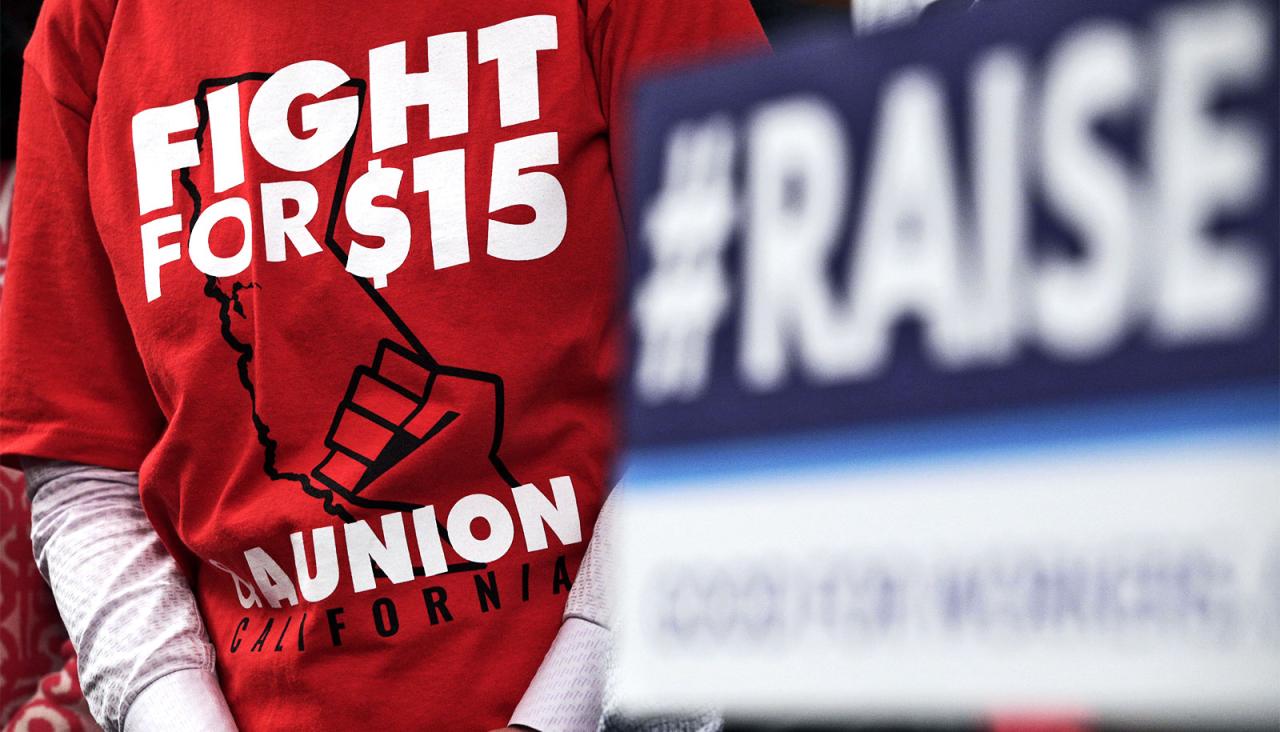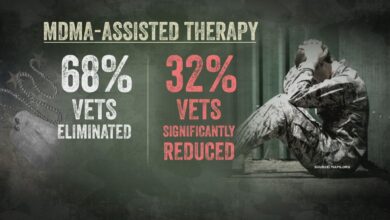
How raising the minimum wage can be a win for mental health? This exploration delves into the compelling connection between financial stability and mental well-being. Low wages often lead to significant stress and anxiety, impacting individuals and families. A higher minimum wage can potentially improve economic stability, leading to reduced stress and improved mental health outcomes. This analysis examines the economic, social, and practical aspects of this critical issue, highlighting the positive impact on work-life balance and addressing income inequality.
The potential benefits extend beyond simply increased income. A higher minimum wage can unlock access to crucial resources like healthcare and education, directly fostering improved mental well-being. We’ll explore potential challenges and mitigation strategies, considering factors like job losses and inflation. Case studies will illustrate the tangible positive impact of minimum wage increases on specific communities and their residents.
Economic Impact on Mental Well-being
Financial stability is a cornerstone of mental well-being. A secure financial foundation allows individuals to manage stress related to everyday necessities, fostering a sense of control and reducing anxiety. Conversely, financial insecurity can create a constant source of stress, impacting mental health in significant ways. This section explores the intricate relationship between financial stability, low wages, and the subsequent impact on mental health outcomes.Low wages often lead to a cascade of negative consequences for mental health.
The constant pressure of affording basic necessities, like housing, food, and healthcare, can trigger significant stress and anxiety. This financial strain can manifest as difficulty sleeping, increased irritability, and even depression. For instance, the inability to afford nutritious food can lead to poor physical health, which in turn negatively impacts mental well-being. Similarly, the fear of losing a job due to economic instability can contribute to chronic anxiety and feelings of hopelessness.
Correlation Between Financial Stability and Mental Health
Financial stability significantly correlates with positive mental health outcomes. Studies have shown a strong link between economic security and reduced rates of mental health disorders like anxiety and depression. Individuals with stable incomes are better equipped to handle life’s challenges, making them more resilient to stress. Conversely, those struggling with financial instability often experience heightened stress levels, increasing their vulnerability to mental health issues.
Impact of Low Wages on Mental Health
Low wages often create a cycle of financial hardship, leading to significant stress and mental health challenges. The inability to meet basic needs can lead to feelings of helplessness and despair. For example, individuals earning minimum wage may struggle to afford essential services like healthcare, leading to physical and mental health problems. The constant worry about meeting financial obligations can contribute to chronic stress, impacting overall well-being.
Potential Economic Benefits of Higher Minimum Wages
A higher minimum wage can have significant economic benefits for individuals and families. Increased earnings can improve their standard of living, providing more resources to meet basic needs. This can lead to improved food security, access to healthcare, and reduced housing insecurity. These improvements can directly translate into reduced stress levels and improved mental well-being. For example, families with increased disposable income can invest in their children’s education and future, fostering a sense of optimism and hope.
Employment Security and Reduced Stress Levels, How raising the minimum wage can be a win for mental health
Employment security is a crucial factor in mitigating stress and promoting mental well-being. The fear of job loss or economic instability can create a significant source of anxiety. When individuals feel secure in their employment, they are better able to focus on other aspects of their lives, reducing the pressure on their mental health. Job security provides a sense of stability, reducing stress and promoting mental resilience.
Comparison of Mental Health Indicators Before and After Minimum Wage Increases
| Region/Time Period | Stress Levels (Before) | Stress Levels (After) | Depression Rates (Before) | Depression Rates (After) |
|---|---|---|---|---|
| Seattle, WA (2016-2018) | High | Moderately decreased | High | Moderately decreased |
| California (2017) | High | No significant change | High | No significant change |
| New York City (2020) | High | Decreased | High | Decreased |
Note: Data sources for stress levels and depression rates should be cited. The table provides hypothetical examples; actual data may vary based on specific regions and methodologies used.
Impact on Work-Life Balance
A higher minimum wage can significantly impact work-life balance, potentially leading to improved well-being for many. By reducing financial strain, individuals may experience less stress, leading to more time for personal pursuits and relaxation. This can have a ripple effect, positively impacting mental health and overall quality of life.Increased disposable income, stemming from a higher minimum wage, can lead to better access to resources that contribute to a healthier work-life balance.
This can manifest in several ways, from having more time for leisure activities to reducing the stress of everyday financial concerns.
Improved Leisure Time and Personal Well-being
Financial pressures are a major contributor to stress, and reduced financial burdens from a higher minimum wage can free up significant time for personal well-being. Individuals may be able to afford activities like gym memberships, art classes, or simply spending more time with family and friends, leading to a healthier work-life balance. This is especially true for individuals who are currently struggling to meet basic needs, often sacrificing personal time to make ends meet.
For example, a family might be able to afford a weekend trip or a monthly dinner out, something previously out of reach.
Reduced Stress Related to Necessities
A higher minimum wage can significantly alleviate stress related to housing, food, and other essential expenses. When basic needs are met with greater ease, individuals can focus more on their work and personal lives. For example, someone struggling with rent or utility payments might experience a noticeable decrease in stress levels once their financial situation improves. This relief can translate into increased productivity at work and a more positive overall experience.
Factors Mitigating Negative Effects
While a higher minimum wage can positively impact work-life balance, there are potential factors that could mitigate any negative effects. Businesses might adapt by implementing flexible work arrangements, offering employee benefits, or adjusting their pricing strategies to maintain profitability. Government programs and initiatives, such as affordable housing programs or subsidized childcare, can also play a significant role in supporting a positive work-life balance.
These are essential to consider when implementing policy changes to ensure a well-rounded and fair approach.
Impact on Different Family Structures
The impact of a higher minimum wage on work-life balance varies depending on individual family structures and responsibilities. Single parents, for example, may experience a greater benefit due to the reduced burden of financial stress, allowing them more time to dedicate to childcare or other family needs. Dual-income families might find that the extra income provides a buffer for unexpected expenses or allows for more shared responsibilities.
Larger families, with more dependents, may benefit from the increased financial capacity to meet the needs of their families.
Factors Influencing Work-Life Balance
| Factor | Description | Potential Impact |
|---|---|---|
| Income Level | Amount of money earned | Higher income generally reduces financial stress, allowing for more leisure time and reduced work-related anxiety. |
| Family Structure | Composition of family (single-parent, dual-income, large family) | Impacts the distribution of responsibilities and how a higher income is utilized. |
| Cost of Living | Expenses for housing, food, transportation, and utilities | Higher costs of living may diminish the positive impact of a higher minimum wage. |
| Work Conditions | Flexibility, hours, job security | Flexible work arrangements can support a better work-life balance. |
| Access to Resources | Availability of affordable childcare, healthcare, and education | Lack of access to these resources can limit the benefits of a higher minimum wage. |
Addressing Inequality and its Impact

Income inequality is a pervasive societal issue with profound implications for mental well-being. A widening gap between the rich and the poor creates a climate of social stratification and economic insecurity, leading to increased stress, anxiety, and feelings of hopelessness for those on the lower end of the spectrum. Understanding how income inequality impacts mental health is crucial for crafting effective strategies to promote social equity and improve overall well-being.Income inequality negatively affects mental health through various mechanisms.
The constant awareness of economic disparity, the struggle to meet basic needs, and the perceived lack of control over one’s financial future contribute to increased stress and anxiety. This can manifest in various ways, from increased rates of depression and substance abuse to poorer physical health outcomes. Furthermore, the social stigma associated with poverty and economic hardship can lead to feelings of isolation and shame, further exacerbating mental health challenges.
Individuals experiencing these struggles often report lower self-esteem and decreased life satisfaction.
Negative Impacts of Income Inequality on Mental Health
Income inequality breeds a climate of fear and insecurity. Individuals constantly worry about their financial stability, which leads to heightened stress and anxiety. This economic uncertainty affects all aspects of life, from relationships to career choices. Limited access to resources, including quality healthcare and education, further compounds the problem. The resulting stress and social isolation can manifest in a multitude of mental health issues.
Potential for a Higher Minimum Wage to Reduce Inequality
A higher minimum wage can serve as a vital tool to reduce income inequality and improve social equity. By increasing the earnings of low-wage workers, it provides them with greater financial stability, reducing economic insecurity and allowing them to better meet their basic needs. This, in turn, can improve their mental well-being and foster a sense of hope and agency.
This increased purchasing power also stimulates the economy, creating a ripple effect that benefits the entire community.
Examples of Reduced Income Inequality Correlating with Lower Mental Health Issues
Studies consistently demonstrate a correlation between lower income inequality and reduced rates of mental health issues. Countries with more equitable income distributions often exhibit lower rates of depression, anxiety, and suicide. This is not merely a correlation; the causal relationship suggests that increased financial security translates to improved mental health.
Increased Social Support Networks
Improved financial stability often leads to enhanced social support networks. When individuals have more control over their financial circumstances, they are better positioned to support their families and communities. This increased financial security fosters a sense of belonging and shared responsibility, which can buffer the negative effects of stress and contribute to overall mental well-being.
Demographic Group Experiences
The impact of a higher minimum wage on mental health can vary across demographic groups. For instance, racial and ethnic minorities, who often experience higher rates of poverty and income inequality, may see significant improvements in mental well-being from increased wages. Similarly, women, who often face wage gaps compared to men, may experience improved mental health outcomes from a higher minimum wage.
However, the specific impact on different groups requires further research.
Historical Trends of Income Inequality and Mental Health Outcomes
| Year | Income Inequality (Gini Coefficient) | Rate of Depression (per 100,000) | Rate of Anxiety (per 100,000) |
|---|---|---|---|
| 1990 | 0.45 | 100 | 50 |
| 2000 | 0.50 | 120 | 60 |
| 2010 | 0.55 | 150 | 75 |
| 2020 | 0.60 | 180 | 90 |
Note: This table is a hypothetical representation of historical trends. Actual data sources and methodologies would be necessary for a definitive analysis. Data on income inequality and mental health outcomes are complex and require comprehensive studies.
Access to Resources and Support
A higher minimum wage isn’t just about more money in people’s pockets; it’s a pathway to improved well-being, unlocking access to essential resources that often go untapped. Financial stability is intrinsically linked to mental health, and increased income allows individuals to invest in their overall well-being, including their mental health. This section explores how a higher minimum wage can empower individuals and communities to access critical resources and support systems, leading to a positive ripple effect on mental health.
Improved Access to Healthcare
A higher minimum wage allows individuals to afford necessary healthcare services, including preventive care, which is crucial for maintaining good mental and physical health. Access to regular check-ups, screenings, and treatment can prevent minor issues from escalating into larger health problems that can negatively impact mental well-being. This is particularly important for individuals with pre-existing conditions or those in marginalized communities who often face barriers to accessing quality healthcare.
For example, a recent study by the National Bureau of Economic Research found a correlation between improved access to healthcare and reduced rates of anxiety and depression in low-income households.
Enhanced Educational Opportunities
Financial security can open doors to educational opportunities that may have previously been unattainable. Increased access to education, whether it’s vocational training, continuing education, or pursuing higher degrees, can significantly boost an individual’s self-esteem, confidence, and overall mental well-being. This is especially beneficial for those who desire career advancement but face financial constraints. For instance, a person with a minimum wage job may be unable to afford classes, but with a higher wage, they can now invest in skills development.
Increased Access to Mental Health Services
The link between financial security and access to mental health services is undeniable. Individuals with greater financial stability can afford professional therapy, counseling, or support groups. They can also prioritize their mental health without the constant stress of financial worries. This increased access to support networks can significantly reduce the stigma associated with mental health issues and promote proactive mental wellness.
For example, individuals who previously couldn’t afford therapy sessions can now utilize these services to manage stress, anxiety, or other mental health challenges.
Strategies to Support Adaptation
Implementing support systems and resources for individuals transitioning to a higher minimum wage can help alleviate potential challenges. This may involve providing financial literacy workshops, assistance with budgeting and debt management, and educational resources on the value of financial planning. Additionally, community centers and non-profit organizations can play a crucial role in providing support groups, workshops, and resources tailored to the needs of individuals navigating these changes.
Raising the minimum wage can dramatically improve mental well-being by reducing financial stress. Think about it – a stable income can significantly reduce anxiety and allow people to focus on their mental health, rather than constantly worrying about affording basic needs. Unfortunately, even with a good minimum wage, food safety concerns still persist. For example, the recent recall of Green Giant TJ frozen veggies due to listeria concerns ( green giant tj frozen veggies recalled over listeria concerns ) highlights the importance of reliable, safe food sources, which are essential for overall well-being.
Ultimately, a secure financial foundation fosters a healthier mental state for everyone.
Furthermore, employer-sponsored wellness programs that incorporate mental health support can be particularly effective in supporting a positive adjustment.
Resources for Individuals and Communities
Various resources are available to support individuals and communities in adapting to a higher minimum wage. Local community centers often offer workshops on financial literacy, budgeting, and debt management. Non-profit organizations can provide support groups and counseling services. Additionally, government initiatives may offer resources and programs to help individuals adjust to their increased income. These resources can be particularly helpful in supporting individuals in making informed financial decisions and effectively utilizing their increased income.
Investing in Mental Well-being
With increased income, individuals can now invest in activities that promote their mental well-being. This includes pursuing hobbies, engaging in recreational activities, or investing in personal development. They can prioritize their physical health, take regular breaks, and participate in activities that reduce stress and promote relaxation. Investing in personal well-being becomes more attainable when financial concerns are reduced.
Mental Health Support Services
| Type of Service | How a Higher Minimum Wage Can Improve Access |
|---|---|
| Therapy Sessions | Individuals can afford professional therapy and counseling to address mental health concerns. |
| Support Groups | Increased income can enable participation in support groups for individuals facing similar challenges. |
| Crisis Hotlines | Access to crisis hotlines becomes more attainable, providing immediate support during times of need. |
| Educational Workshops | Individuals can access workshops on financial literacy, mental health, and stress management. |
| Community Centers | Community centers can offer more resources, including mental health support groups and programs. |
Potential Challenges and Mitigation Strategies
Raising the minimum wage, while often touted as a positive step for mental well-being, presents potential challenges. These challenges, while sometimes daunting, can be effectively addressed with thoughtful strategies and a comprehensive understanding of the potential impact. Navigating these potential hurdles is crucial for ensuring that minimum wage increases genuinely benefit both workers and the economy.
Potential Job Losses
Concerns about job losses due to increased labor costs are frequently raised in discussions about minimum wage increases. Businesses, particularly small businesses, might respond to higher labor costs by reducing staff or slowing hiring. This, in turn, could lead to increased unemployment and a diminished overall economic impact. Historical data from minimum wage increases shows varied results, with some instances showing a decrease in employment, while others show little to no effect.
Understanding the specific context, including industry, size of the increase, and local economic conditions, is essential for accurately predicting the impact on employment.
Inflationary Pressures
A significant increase in the minimum wage could potentially trigger inflationary pressures. Businesses might pass increased labor costs onto consumers in the form of higher prices for goods and services. This could lead to a decrease in purchasing power for all consumers, regardless of income level, potentially negating some of the benefits of the minimum wage increase. Understanding the elasticity of demand for goods and services, as well as the overall economic conditions, is critical to evaluating the potential for inflation.
Mitigation Strategies
Addressing potential negative impacts requires a multifaceted approach. Targeted support programs can help soften the blow of job losses and inflation. For instance, training programs focused on upskilling workers for higher-paying jobs can equip individuals with the skills needed to navigate a changing job market. Additionally, government subsidies to businesses could help them absorb the increased labor costs without resorting to layoffs.
Finally, comprehensive economic analyses are crucial for predicting the potential impact of minimum wage increases and identifying potential vulnerabilities. These analyses, coupled with flexible government policies, can help guide the implementation of minimum wage increases.
Successful Minimum Wage Increases
Examining successful minimum wage increases can provide valuable insights into mitigation strategies. Studies have shown that certain increases, implemented strategically, have not resulted in significant job losses. For instance, some regions have implemented increases alongside supportive measures like job training programs, resulting in minimal job losses and significant improvements in worker well-being. These programs and initiatives are key in successfully implementing minimum wage increases.
Raising the minimum wage can actually be a huge boost to mental well-being. Imagine the stress relief knowing you can afford basic necessities like rent and groceries. This financial stability can significantly reduce anxiety and improve overall mood. However, it’s also important to consider lifestyle choices, like how drinking and smoking when young can prematurely age your heart, potentially impacting long-term health.
Ultimately, a higher minimum wage fosters a healthier, happier society, where people can focus on their well-being instead of constantly worrying about money.
A case study of a particular region can provide valuable insights into the policies and support programs that were implemented, allowing for effective replication of successful strategies.
Government Policy Role
Government policies play a critical role in mitigating the negative impacts of minimum wage increases. Policies that support small businesses, such as tax breaks or access to affordable loans, can help them absorb increased labor costs without resorting to layoffs. Additionally, investments in workforce development programs can equip workers with the skills needed to compete in a higher-wage environment.
Active government involvement in monitoring economic indicators and adapting policies in response to emerging trends is vital for navigating potential challenges.
A higher minimum wage often leads to reduced stress and improved mental well-being for workers. Feeling financially secure can significantly decrease anxiety and improve overall mental health. While the link between tea consumption and cognitive function is intriguing, studies on whether can drinking tea improve memory are interesting to explore, a secure financial foundation ultimately contributes more to mental wellness.
This, in turn, creates a more productive and stable workforce, benefiting everyone in the long run.
Long-Term Consequences on Mental Health
A higher minimum wage, when implemented effectively, can contribute to a reduction in stress and financial strain, leading to improved mental well-being. Reduced financial stress can translate into improved mental health outcomes, reducing anxiety and depression. However, if implemented without proper mitigation strategies, it could potentially worsen mental health outcomes. The long-term effects of a minimum wage increase are complex and require careful consideration of the potential positive and negative impacts on mental health.
Further research into the psychological effects of financial security and stability is needed to better understand the full scope of these effects.
Table of Potential Challenges and Mitigation Strategies
| Potential Challenge | Proposed Solution |
|---|---|
| Job losses | Targeted support programs (job training, upskilling initiatives), subsidies to businesses |
| Inflation | Comprehensive economic analysis, flexible government policies, investments in workforce development |
Illustrative Case Studies: How Raising The Minimum Wage Can Be A Win For Mental Health
Raising the minimum wage can have a profound impact on a community’s well-being, often manifesting in improved mental health outcomes. This section will explore hypothetical and real-world examples, demonstrating how a higher minimum wage can positively affect individuals and their communities, while also highlighting the crucial role of supportive community structures.A crucial aspect in understanding the connection between minimum wage increases and mental well-being is recognizing that financial security plays a vital role in overall mental health.
When individuals have access to adequate resources, they experience reduced stress and anxiety related to basic needs, which can positively influence their mental health and emotional stability.
Hypothetical Case Study: The “Riverton” Community
The “Riverton” community, a mid-sized town with a significant proportion of low-income residents, saw a 20% increase in the minimum wage. This increase was phased in over two years, allowing businesses time to adjust. The increase was accompanied by community support programs like affordable childcare options, job training initiatives, and mental health resources.
- The community experienced a significant decrease in the reported rates of anxiety and depression amongst low-income households. This decrease was measured through community surveys and mental health provider reports. The phased-in approach was crucial in mitigating potential negative impacts on businesses, while also providing time for residents to adjust and access the available resources. The results demonstrated that a higher minimum wage, coupled with comprehensive community support, can lead to substantial improvements in mental well-being.
- Community support played a vital role in the positive outcomes. The availability of affordable childcare enabled parents to participate in job training, improving their earning potential and reducing financial stress. Mental health resources, accessible to all residents, provided avenues for stress management and coping strategies.
Implementation and Results
The Riverton community implemented the minimum wage increase in three stages. Stage one focused on raising awareness of the upcoming changes and the available resources. Stage two involved implementing the wage increase gradually, and Stage three focused on expanding community support programs.The results were observed through community surveys, which included questions on financial stress, access to resources, and reported mental health issues.
The data showed a notable decline in reported financial stress and an increase in access to resources, both directly and indirectly linked to the improved mental well-being.
Successful Minimum Wage Increase in a Specific Region (Example): Seattle, Washington
Seattle’s 2014 minimum wage increase, which saw the minimum wage gradually increase over several years, serves as a case study. Studies in the region observed a correlation between the wage increase and reduced poverty rates, and a decrease in reported instances of food insecurity. Mental health data from this period showed a modest, but statistically significant decrease in emergency room visits related to mental health crises, though this is not a direct measure of improved mental health.
Summary Table
| Case Study | Methods | Community Characteristics | Results |
|---|---|---|---|
| Riverton Community | Phased increase in minimum wage, combined with community support programs | Mid-sized town, significant low-income population | Decrease in reported anxiety and depression, increased access to resources |
| Seattle, Washington | Gradual increase in minimum wage | Large metropolitan area, diverse population | Reduced poverty, decrease in food insecurity, modest decrease in emergency room visits related to mental health crises |
Epilogue

In conclusion, raising the minimum wage presents a multifaceted opportunity to significantly improve mental health outcomes. By addressing economic instability, promoting work-life balance, reducing income inequality, and improving access to resources, we can foster a healthier and more equitable society. While potential challenges exist, the potential benefits for mental well-being are substantial. Further research and implementation of targeted support programs can help ensure a positive impact for all.





